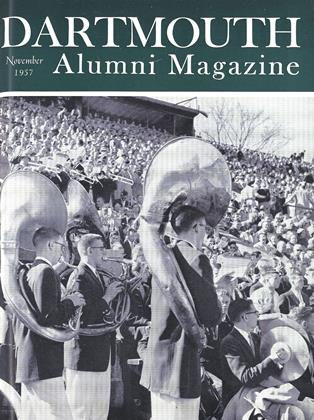ONCE upon a time we felt that Dartmouth alumni were inclined to protest too much; that they were haunted by the fear that someone might not sufficiently have heard of the glories of their College and should be alerted without delay. Their feeling was, admittedly, based on the loyal conviction that Dartmouth had something that other institutions lacked, but its force was vitiated by the unacknowledged suspicion that this fact was not instantaneously obvious to the uninitiated. Through some sort of brash inferiority complex the sons of the Old Mother saw their College's name overly large in the headlines. They were inclined to bristle in intercollegiate conversations and to worry over what Harvard might think.
This sincere and often helpful love of the College and its locale carried with it attendant disadvantages, not only of the risk of boring outsiders to extinction, but of too deeply embroiling alumni in purely local problems. Thus, when the Orozco frescoes were spread on the walls of Baker Library, many a loyal son became an authority on art. He didn't know Monet from Manet and had never even heard of Giotto, but Art was involving his College and was, therefore, an immediately burning issue. Current expertizing on architectural styles and periods is merely another indication of the rapport between the College and her offspring.
All in all, there seemed to us to be too up-state an attitude among Dartmouth men. They were not at home in Zion, and since we ourself were at that time in a highly competitive racket, where keeping face and a good front were all-important assets, we made frequent pleas to our constituency to adopt an Olympian calm, a fine disregard, an indifference to the impact on sister institutions of our decisions, whether foolish or sapient. This appealed to us as good technique in holding our opposite numbers off balance, especially as some were only vaguely aware of the existence of any other colleges, some completely oblivious to the fact, and some aggressively scornful.
We have subsequently decided that our judgment was completely at fault. We do not refer to the dangerous complacency that crept, here and there, into Dartmouth alumni activities—the conviction that, since the Marine Corps reported every fox-hole in the South Pacific a Dartmouth indoctrination center, we could rest mutely and gloriously on our laurels. We are, rather, here concerned with the value of an institutional heritage, born of a frontier isolation and not lightly to be cast off; of an innate naivete, a wide-eyed and youthful enthusiasm that those within the sound of the subway cannot hope to attain. We do not plump for emotional dressing-room fight talks, or for Stover, or for Roy and the Crimson Sweater, or for the team's forming a "V" to rescue the heroine from the burning theater. But we would not disdain the feeling of joy in victory, of desolation in defeat, of a catch in the throat at the College song, or in the heart at a glimpse of the October sun on the Vermont hills—a katharsis not readily available to the haughty or the blasè.
The sense of wonder is not punched on IBM cards or listed in the college catalogue, but it is a precious part of the Dartmouth heritage that we would be loath to forswear.
"My heart leaps up when I behold A rainbow in the sky . . . So be it when I shall grow old, Or let me die."
[EDITORIAL NOTE: A collection of HanoverScene columns from the ALUMNI MAGAZINE will be published in book form by Dartmouth Publications on December I.]
 View Full Issue
View Full Issue
More From This Issue
-
 Feature
FeatureHanover in the Ice Age
November 1957 By RICHARD J. LOUGEE '27 -
 Feature
FeatureBeyond Independence: Creativity
November 1957 -
 Feature
FeatureGlass Funds and the Capital Campaign
November 1957 -
 Feature
FeatureClub Officers Form Association
November 1957 -
 Class Notes
Class Notes1918
November 1957 By ERNEST H. EARLEY, W. CURTIS GLOVER, RICHARD P. WHITE -
 Class Notes
Class Notes1916
November 1957 By WILLIAM L. CLEAVES, F. STIRLING WILSON, RODERIQUE F. SOULE1 more ...
BILL McCARTER '19
-
 Article
ArticleNot So Long Ago .... Direful Days
March 1934 By Bill McCarter '19 -
 Article
ArticleThe Hanover Scene
April 1954 By BILL McCARTER '19 -
 Article
ArticleThe Hanover Scene
March 1956 By BILL McCARTER '19 -
 Article
ArticleThe Hanover Scene
June 1956 By BILL McCARTER '19 -
 Article
ArticleThe Hanover Scene
February 1958 By BILL McCARTER '19 -
 Article
ArticleTHE HANOVER SCENE
JANUARY 1959 By BILL MCCARTER '19







